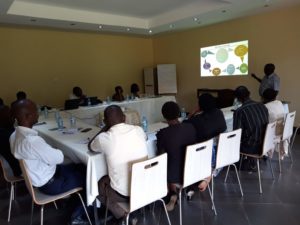WEBINAR: A focused ethnographic study: investigating the barriers to antenatal care attendance to improve IFAS in Kenya
Have you heard of the focused ethnographic study (FES)? In this webinar, hosted by our colleagues at the International Initiative for Impact Evaluation (3ie) on February 26th, 2020, SISN Vice President, Dr Gretel Pelto provided an overview of FES; an approach designed to describe typical or usual behaviours, practices and beliefs within a population, in order to inform planning, development, feasibility, or success of social, public health or nutrition interventions in a given environment.
Following this brief introduction, the Implementation Science Initiative (ISI) Team in Kenya presented how they applied the FES approach to examine the barriers for early initiation of focused antenatal care (ANC) through the Baby-friendly Community Initiative (BFCI). The FES approach is helping them build a picture of the behaviours, practices, beliefs and environments important to pregnancy from the perspectives of households and health service providers. The goal is to generate a descriptive model of context-specific perceptions of pregnancy to inform further actions to improve the delivery of iron-folic acid supplementation (IFAS) program.
Following these presentations, SISN Senior Technical Lead, Isabelle Michaud-Letourneau facilitated a lively 20-minute Q&A period.
We are pleased to share a FREE recording with you, as well as a PDF version of the slides.
We hope that you find the webinar informative. We welcome your thoughts, comments and questions on the topic or the webinar itself. Please send any feedback to: info@implementnutrition.org. We also encourage you to share this webinar with anyone who may find it of interest and be interested in future SISN events.
Further Reading on Focused Ethnographic Studies
-
Pelto, G. H., Armar-Klemesu, M., Siekmann, J. and Schofield, D. (2013), The focused ethnographic study ‘assessing the behavioral and local market environment for improving the diets of infants and young children 6 to 23 months old’ and its use in three countries. Matern Child Nutr, 9: 35–46.
-
Pelto GH, Armar‐KlemesuM. (2015) Identifying interventions to help rural Kenyan mothers cope with food insecurity:results of a focused ethnographic study. Maternal and Child Nutrition,11(S3), pp.21-38.
-
Thuita, F. M., Pelto, G. H., Musinguzi, E., & Armar-Klemesu, M. (2018). Is there a” complementary feeding cultural core” in rural Kenya? Results from ethnographic research in five counties. Maternal & child nutrition, e12671.
-
Kalra, N., Pelto, G., Tawiah, C., Zobrist, S., Milani, P., Manu, G., Laar, A. and Parker, M., (2018). Patterns of cultural consensus and intracultural diversity in Ghanaian complementary feeding practices. Maternal & child nutrition,14(1), p.e12445.
-
Lee, J., Pelto, G. H., Habicht, J. P., Bhuiyan, M. M., & S Jalal, C. (2019). Identifying nutrition and health-relevant behaviors, beliefs, and values of school-going adolescent girls in rural Bangladesh: context for interventions. Current developments in nutrition,3(5), nzz013.
Look out for details of upcoming webinars in the 2020 Series here.
Permission for Use: This webinar and the associated pdf version of the slides may be copied in any form and used for non-commercial purposes provided that the content of any copy is not altered and, it is clearly indicated that 3ie/SISN is the originator of this material.
The Implementation Science Initiative (ISI) in Kenya and Uganda is a collaborative and learning initiative developed by SISN in partnership with International Initiative for Impact Evaluation (3ie) thanks to a grant from the Bill and Melinda Gates Foundation. You can learn more about the ISI here.


